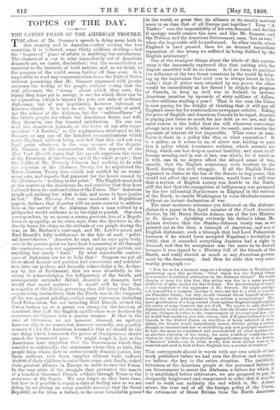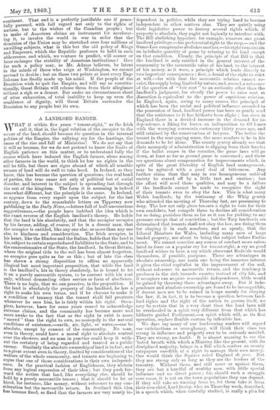TOPICS OF THE DAY
THE LATEST PHASE OF THE AMERICAN TROUBLE.
THE effect of Mr. Sumner's speech is dying away both in this country and in America,—after costing the two countries, it is believed, some thirty millions sterling,—but the "improved" phase of affairs is anything but satisfactory. The chances of a war to arise immediately out of American demands are, no doubt, diminished ; but the reconciliation so essential to the interests of both nations, and, as we think, to the progress of the world, seems further off than ever. It is impossible to read any communication from the United States without perceiving that Mr. Sumner expressed with precise accuracy the feeling of his people, without seeing that the real grievance, the " wrong " about which they care, the injury they hope yet to avenge, is one for which there can be no reparation, which is beyond the pale, not only of ordinary diplomacy, but of any negotiation, however informal or however elastic. It is not an act, but an attitude of mind, not the release of the Alabama, but the " unfriendliness " of the British people, for which the Americans desire, and will, they threaten, one day demand satisfaction. No one can real the American journals, or the letter of our able correspondent " A Yankee," or the explanations attributed to Mr. Sumner, or any one of the hundred communications which reach England, without being satisfied that this, and not any legal point whatever, is the very essence of the dispute. Mr. Sumner, in his conversation with the reporter of the .Xcio York Herald, states that his speech expresses the views of the President, of the Senate, and of the whole people ; that the dislike of Mr. Reverdy Johnson had nothing to do with the rejection of the Alabama Treaty, for he negotiated the Naturalization Treaty also, which was ratified by an unanimous vote, and repeats that payment for the losses caused by the Alabama is " nothing to the point." The English must look at the matter as the Americans do, and consider that they have battered down the seaboard cities of the Union. The " American people ask nothing but what is fair, and mean to have justice at last." The Evening Post, most moderate of Republican papers, declares that America will no more consent to arbitration on the matter of the Alabama than a man robbed by a pickpocket would arbitrate as to his right to punish. Our own correspondent, by no means a strong partizan, less of a Republican in sympathy, as he often says, than the Spectator is, distinctly bases his claim on the attitude of our people during the war, on Mr. Roebuck's contempt, and Mr. Laird's greed, and Earl Russell's lofty indifference to the fate of such "political invertebrates." America, he says, and he says quite truly, —it is the precise point we have been hammering at all through the controversy,—is not aggressive, not angry, not pettish, not anything but sorely " hurt." By what conceivable contrivance of diplomacy are we to help that ? Suppose we put all ideas about honour and position and consistency and truthfulness into our pockets, and formally acknowledge a lie, declare, say by Act of Parliament, that we were dreadfully in the wrong in acknowledging the belligerency of the South, and consequently surrender British America as damages, how would that mend matters ? It would still be true that a majority of the British governing class did detest the North, —perceiving instinctively that the North was in the vanguard of the war against privilege,—that many statesmen, including Lord Palmerston, but not including Earl Russell, wished the Union broken up as a power too strong for the freedom of mankind, that half the English middle-class were deceived by erroneous intelligence into a similar temper. If that is the root of bitterness, no act however unusual, no apology however abject, no concession however cowardly, can possibly remove it ; for the American demand is that we should do the one thing which transcends the power of Omnipotence, should cancel the transacted past. We might forget it, just as the Americans have forgotten that the Government which they consider so unfriendly, the statesman whom they so hate, the people from whom they so acrimoniously demand justice, lent them millions, sent them supplies without limit, suffered 40,000 of their children to enter their army, and, finally, risked their greatest alliance in Europe in order to save the Union. In the very crisis of the struggle they prevented the march of a hundred thousand French soldiers through Texas to the assistance of the South. We may forget as they have done, but how is it possible to repair a state of feeling save as we are doing, by admitting on every possible occasion that the Great Republic, so far from a failure, is the most formidable power
in the world, so great that its alliance or its enmity matters more to us than that of all Europe put together ? Even " A Yankee " sees the impossibility of his own demand, and doubts if apology would remove the sore, and like Mr. Sumner, and the Tribune, and the American Government, says, 'Let us wait.' when the impossible will be performed. In other words, when England is hard pressed, then let us demand immediate reparation of the wrong we suffered in being disliked by the English aristocracy !
One of the strangest things about the whole of this controversy is the incessantly expressed idea that waiting with the dispute unsettled will do no harm. Is it no harm to paralyze the influence of the two freest countries in the world by keep. ing up the impression that civil war is always latent in their midst ? that if either were attacked by any power the other would be immediately at her throat ? to cripple the progress of Canada, to keep up civil war in Ireland, to increase American taxation by upwards of sixty millions of dollars, twelve millions sterling a year? That is the sum the Union is now paying for the delight of thinking that it will pay off England some day for contumelious newspaper articles. Taking the price of English and American Consols to be equal, America is paying just twice as much for her debt as we are, and the main reason is the belief that she will whenever convenient plunge into a war which, whatever its result, must render the payment of interest all but impossible. What sense or manliness is there in a policy like this, or what reparation ? It is a policy, as it seems to us, of silent war, leading to pure loss, a policy which terminates nothing, which amends nothing, which can but deepen mutual hostility, and must to all human seeming end in war at last, war which, let it result as it will, can in no degree affect the alleged cause of war, namely, that the English aristocracy were insolent to the North during the civil struggle. If all the English Dukes appeared in chains at the bar of the Senate to beg peace, that would not affect the past transaction, would leave it still true that a section of English society was hostile to the North, still the fact that the recognition of belligerency was prompted by the few influential Northerners in England in the interest of the North, to enable Washington to seize blockade-runners without an instant declaration of war.
The most moderate utterance yet delivered on the Alabama claims is a paper in the April number of the North American Review, by Mr. Henry Brooks Adams, son of the late Minister to St. James's. Speaking evidently his father's ideas, Mr. Adams declares that the Stanley-Johnson treaty was, as we pointed out at the time, a triumph of American, and not of English diplomacy, such a triumph that had Lord Palmerston foreseen it he would have accepted Napoleon's invitation in 1862; that it conceded everything America had a right to demand, and that its acceptance was the more to be desired because it was signed by a Ministry full of the friends of the North, and really elected as much as any American government by the democracy. And then he adds this very noteworthy paragraph : " Now let us for a moment suppose a foreign minister in Washington meditating upon this problem : What object has the United States Government in refusing arbitration on the Alabama claims?' He would dismiss at once the idea that this action was due to a mere passing ebullition of spite against the late Cabinet. The determination to reject is not restricted to the opponents of Mr. Seward. He might perhaps ask himself for a moment, whether it were not due to a wish to conciliate President Grant ; but why should General Grant himself desire to hamper his whole Administration by so serious a complication? The mere gratification of a long-nursed wrath against England might explain the action of some Senators, but not of all. We regret to add, that the diplomatist would not entertain tho idea that the Senate was influenced by any virtuous devotion to the improvement of international law; for he would feel confident, and with reason, that, if England offered to cede Canada to the United States, on condition of being relieved of these claims, the Senate would immediately assent, without giving a second thought to international law or establishing any new principle whatever In fact, the more ho considered and reconsidered all other motives for an absolute rejection of the treaty, the more confident would his conclusion be, that the idea of territorial aggrandizement lay at the bottom of Senators' minds,—or, in other words, that those claims wore to, be reserved and used to lead or force England into a cession of territory. '
That corresponds almost in words with our own article of last week, published before we had seen the Review, and contains, we believe, the key to the entire situation. The justifiable bitterness of the American people at the presumed failure of our Government to arrest the Alabama, a failure for which, if it is established before arbitrators, we are prepared to pay, ls designedly heightened and exasperated in order that it may be used to work out suddenly the end which is, Mr. Adams avows, the true end of all the foreign policy of the Union, the retirement of Great Britain from the North American
continent. That end is a perfectly justifiable one if peacefully pursued, with full regard not only to the rights of nations, but to the wishes of the Canadian people ; but to make of American claims an instrument for accelerating it, to involve the world in war in order that the dominion of the Union may be stretched over four millions of unwilling subjects, what is this but the old policy of Kings and Emperors, which the Republic professes to hold in such abhorrence, and which, we venture to predict, will sooner or later endanger the stability of American institutions ? How far such a policy may, as Mr. Adams believes, be latent in the minds of those who reign at Washington, we cannot pretend to decide ; but on these two points at least every Englishman has finally made up his mind. If the people of the Dominion wish to quit the Empire, and will say so constitutionally, Great Britain will release them from their allegiance without a sigh or a demur. But under no circumstances short of utter exhaustion, of total inability to keep up even the semblance of dignity, will Great Britain surrender the Dominion to any people but its own.































 Previous page
Previous page